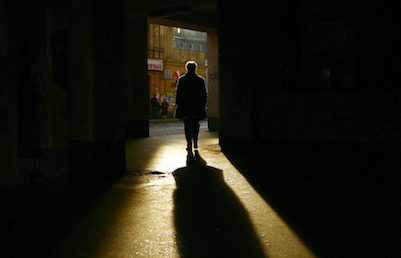What is your shadow or dark side?
Have you ever been pushed into uncomfortable places – maybe even facing the dark side of your personality? While it’s often not pleasant, it can be very insightful.
I was recently doing a short personal development course and one of the exercises asked us to dialogue with our ‘shadow.’ You might be asking what do you mean by your shadow?

Our shadow or dark side refers to the parts of us or the personas that the conscious mind does not identify with or acknowledge. It represents the aspects of ourselves that we don’t like or hold self-judgements about. We then relegate them to our dark side by denying they exist – rejection and repression. Our shadow then stays hidden in the subconscious mind.
For example, we might relegate to our shadow the parts of us that are spiteful, vengeful or aggressive or conversely the parts of us that are weak, insecure or vulnerable. We’ve often been taught by our parents and environment to judge ourselves quite harshly, about all sorts of things!
Please know that your shadow has been developed over time as coping, protective and survival mechanisms. Most people don’t know that and so sometimes facing our shadow – having an honest look in the mirror – can be so disconcerting that we actually can’t face doing it. It’s too painful, and possibly even traumatic.
An example of a shadow or dark side in action
- My husband and I were recently watching a documentary made by a Jewish man who lost most of his family during the Holocaust. He interviewed two mature men who both had been young sons of Nazi war criminals during WWII.
- At the start of the documentary the 2 men were friends but by the end of their visits to key buildings and mass grave sites etc, one man decided that he could no longer be friends with the other.
- Why? Because Hans simply could not face that his father had committed those crimes and wanted to keep believing that his father was a good and well-intentioned man. Even when presented with clear evidence his shadow side would not permit him to acknowledge it.
- As I was watching I was commenting that he was delusional because his denial was so strong, but also struck by the sheer power of our shadow parts to protect us and keep us safe.
- Another thing to note is that the more the others pushed Hans to admit and acknowledge the irrefutable evidence, the stronger the protection resisted.
- Even though we could judge Hans as being morally wrong, I could see that every cell of his being was in survival mode.
- Hans was over-identified or strongly attached to his father so if he were to condemn his father it would mean that he would be condemning himself. His father died for his crimes so for Hans to condemn his father would mean death for him too – figuratively speaking!
- That’s how the subconscious mind works! Powerful stuff isn’t it?! This is why I say that facing your shadow can be traumatic.
The purpose of your shadow
I believe we have two aspects of the shadow – the dark side of our human nature:
- The aspect we are consciously aware of when it comes out to play – when we immediately judge or reject ourselves for what we’ve just thought, said or done.
- The aspect that stays unconscious – out of our awareness – because it creates intense and overwhelming emotions like shame, guilt and fear if we were to become aware of it.
I am highlighting this because I don’t want you to judge yourself if a shadow or dark aspect of yourself reveals itself. It’s kind of like ‘inviting the monsters to tea.’ Once you get through the initial shock etc, you realise there is a lot more underneath – sometimes even gold.
Each shadow part of you does have a purpose and a gift. It often depends on how you choose to look at it and to then consciously engage those traits in healthy and functional ways.
As an example, let’s look at being competitive.
It can cause disharmony and disconnection from others and lead to a lack of cooperation and collaboration. If you’re being competitive to the point that you cheat, climb over others or disempower others to win at all costs then there is definitely a dysfunctional or unhealthy competitive shadow.
However, if your competitive side drives you to fulfil more of your potential while still being gracious, humble, cooperative and aware of others’ needs then you are more likely to accept and utilise your competitive trait in healthy ways and bring it out of the shadow.
Roger Federer is a good example of healthy competition while John McEnroe probably had a shadow or dysfunctional aspect of competition, even though both men are recognised for being fantastic tennis players. Incidentally, unhealthy competition often comes from a lack of self-worth.
How to find the gift in your shadow or dark side
Here is a personal example of finding the gift during a dialogue with one of my shadow parts while I was journaling first thing in the morning:
- Shadow: “I have to prove to myself that I’m enough.”
- Response: “No I don’t! I have to prove to myself that I can love deeply, show compassion and kindness, respond to my and other’s emotions – especially the intense ones, have fun, live a stimulating and rewarding life doing what I love to do. Fulfilment, joy, contentment, love, faith, trust, intimacy, connection. i.e. have a rich and evolving human experience.”
- Purpose & Gift: This shadow part inspires me to grow and to develop deep personal love & acceptance.
- Intention: “I am rich and evolving feeling wonder and delight.”
Your shadow side is a part of who you are. You can’t live without it. In fact, you need it. So please don’t reject or judge yourself for having a ‘dark side.’
Our job is to shine a light of love and compassion on our shadow so that you can transform or evolve any dysfunctional aspects and turn them into new healthy, functional and empowering traits.
Learning to transform your shadow and see its gifts will help you feel more whole and complete within yourself and relaxed and at ease with others.
Like to learn more?
This is a great article on the shadow if you’d like to learn more:
https://highexistence.com/carl-jung-shadow-guide-unconscious/





